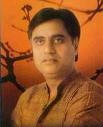Contribute
| Jagjit Singh - Live In Concert |
Press Release
03/31/2009
The Legend
A Farewell Tour
When: April 19, 2009
Time: 6:00 pm
Where: John Hancock Hall, 180 Berkeley Street, Boston
Buy Tickets
Wo Kaagaz ki Kashti, wo Baarish ka pani!
Transporting one back to simpler, unhurried times while delicately provoking memories and emotion, Jagjit Singh's ghazals transcend barriers of age, language and culture.
With a velvety voice, beloved to ghazal aficionados around the world, Jagjit Singh's prolific oeuvre is as extensive as his popularity. He is credited with bringing Ghazal appreciation from its elitist confines to the reach of the layperson.
Jagjitji has tremendous appeal among folks of all ages. He is to be credited for bringing ghazals to the attention of music lovers around the world. He is a pioneer who made Urdu lyrics accessible to listeners. His greatness lies also in the fact that he himself chooses every ghazal, geet or nazm that he composes music for or lends his voice to.
Born in Sri Ganga Nagar in Rajasthan, Jagjit Singh's passion for music started early in life. While his family wished he would pursue a career in the Indian Civil Services, Jagjit chose to chase his dream. He trained with Ustad Jamaal Khan for fifteen years, reinforcing his education with hours of dedicated riyaaz.
When Jagjit Singh moved to Bombay in 1965, he sang jingles for ads and soon teamed up with Chitra Singh, who later became his partner musically and in life. Chitra and Jagjit became the Ghazal duo of Bombay and were much in demand in private mehfils. Their repertoire grew, as did their fame and soon the two were a fixture on the Bombay cultural circuit. Their albums Unforgettables, Live at Wembley, Milestone, Passion, Echoes and Main Aur Meri Tanhai became huge hits with the listening public.
Jagjit Singh has always maintained that he only sings nazms that he can pour his soul into. He makes sure that the meaning of the nazms can be accessed by every one of his listeners.
He also composed and sang for Bollywood films starting with Arth and Saath Saath. Who can forget the ghazals from Gulzars TV series Mirza Ghalib with exquisite music by Jagjit Singh or Chitra Singh's near flawless rendition of Yeh Na Thi Hamari Kismat?
The soulful singer has won several awards including the Sahitya Academy Award in 1998, for popularizing Ghalib. The Madhya Pradesh government also honoured him with 'The Late Magnesia Samoan' in 1998. A professional to the core, he takes an interest in the making of each of his albums and is involved in selecting the ghazis, to composing the music and all the other related minutes details. He was awarded the Padmashree on January 26, 2004.
The word ghazal is an Arabic word that means, "to talk to women". The evolution of the ghazal gayaki is a momentous one. Initially written in Persian, it can be traced to origins in India during the advent of the Muslim rule in India in the 12th century. Hazrat Amir Khusrau (1253-1324), eminent poet, scholar, statesman and musicologist, who is credited with many masterpieces of Persian poetry, is said to be the major propagator of the ghazal.
The pinnacle of the ghazal was between the 18th and 19th centuries when Urdu became the preferred language of poetry and culture throughout India. Poets such as Sauda, Mir Taqi Mir, Zauq, and Mirza Ghalib wrote ghazals which are considered hallmarks of Urdu poetry. Owing to their increasing popularity, ghazals began to be set in melody and musicians started to use them as part of their repertoire. Early pioneers included Ustad Mauzuddin Khan and Gauhar. Later, vocalists of the caliber of Ustad Barkat Ali Khan, Mukhtar Begum and Begum Akhtar established themselves as major exponents of ghazal gayaki.
You may also access this article through our web-site http://www.lokvani.com/
